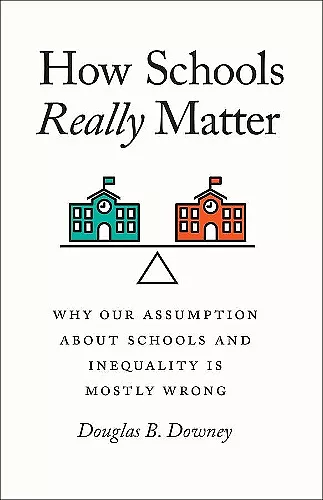How Schools Really Matter
Why Our Assumption about Schools and Inequality Is Mostly Wrong
Format:Paperback
Publisher:The University of Chicago Press
Published:26th Oct '20
Should be back in stock very soon

Most of us assume that public schools in America are unequal--that the quality of the education varies with the location of the school and that as a result, children learn more in the schools that serve mostly rich, white kids than in the schools serving mostly poor, black kids. But it turns out that this common assumption is misplaced. As Douglas B. Downey shows in How Schools Really Matter, achievement gaps have very little to do with what goes on in our schools. Not only do schools not exacerbate inequality in skills, they actually help to level the playing field. The real sources of achievement gaps are elsewhere. A close look at the testing data in seasonal patterns bears this out. It turns out that achievement gaps in reading skills between high- and low-income children are nearly entirely formed prior to kindergarten, and schools do more to reduce them than increase them. And when gaps do increase, they tend to do so during summers, not during school periods. So why do both liberal and conservative politicians strongly advocate for school reform, arguing that the poor quality of schools serving disadvantaged children is an important contributor to inequality? It's because discussing the broader social and economic reforms necessary for really reducing inequality has become too challenging and polarizing--it's just easier to talk about fixing schools. Of course, there are differences that schools can make, and Downey outlines the kinds of reforms that make sense given what we know about inequality outside of schools, including more school exposure, increased standardization, and better and fairer school and teacher measurements. How Schools Really Matter offers a firm rebuke to those who find nothing but fault in our schools, which are doing a much better than job than we give them credit for. It should also be a call to arms for educators and policymakers: the bottom line is that if we are serious about reducing inequality, we are going to have to fight some battles that are bigger than school reform--battles against the social inequality that is reflected within, rather than generated by--our public school system.
"Downey challenges the ideas that schools are engines of inequality and that schools can be effectively transformed to substantially reduce inequality. Having completed some of the most influential recent work on the topic, he shows that most of the inequalities we observe are rooted in skills children do and do not possess on their very first day of school., and the evidence suggests that For the most part, schools keep differences from getting bigger. Schools can only get you part of the way If you want to have to a more equal opportunity structure for kids. If equality of opportunity is your goal, then you have to invest more heavily in solutions outside rather than inside of schools."--Eric Grodsky, University of Wisconsin-Madison "This book is a must-read for anyone interested in education equality and policy. How Schools Really Matter offers a much-needed corrective to the assumption that student achievement gaps are the product of woefully inadequate schools and teachers. Downey shows that schools compensate for out of school inequality much more than we give them credit for."--Janice Aurini, University of Waterloo "Downey's book takes on the widely held belief that our public schools are failing our neediest children, most especially children of low-income background. Critics on the left invoke underfunded schools, underqualified and undermotivated teachers, and hyper-segregation; for those on the right, and some on the left, it is the opening for charter schools and vouchers. Wrong, says Downey: our schools, on the whole, lift up poor children, not hold them back, implicating instead inequities experienced over the preschool years and in children's home lives outside of school. Read this important book with an open mind. It could very well change how you--how we all--think about schools and inequality." --Karl Alexander, co-editor of The Summer Slide: What We Know and Can Do About Summer Learning Loss "It's not often that a publication changes the way we think the world works. Communicated in remarkably clear prose, Downey's incisive empirically based analysis reveals that inequality increases significantly when children are out of, not while they are in, school. How School's Really Matter is an eye-opener, as well as a call to action--that is, a more focused endeavor to reduce the large disparities in children's social and physical environments, including those of their early childhood." --William Julius Wilson, Harvard University
ISBN: 9780226733227
Dimensions: unknown
Weight: unknown
176 pages